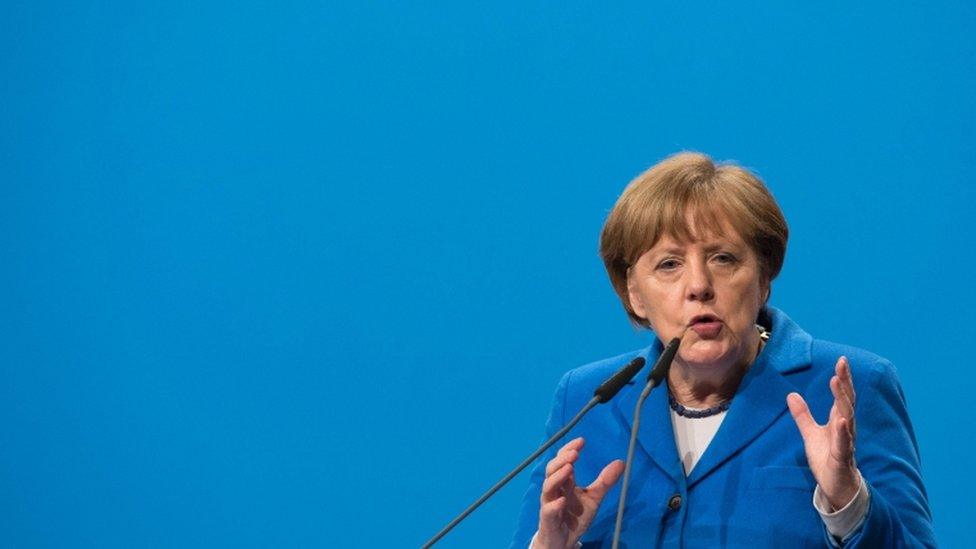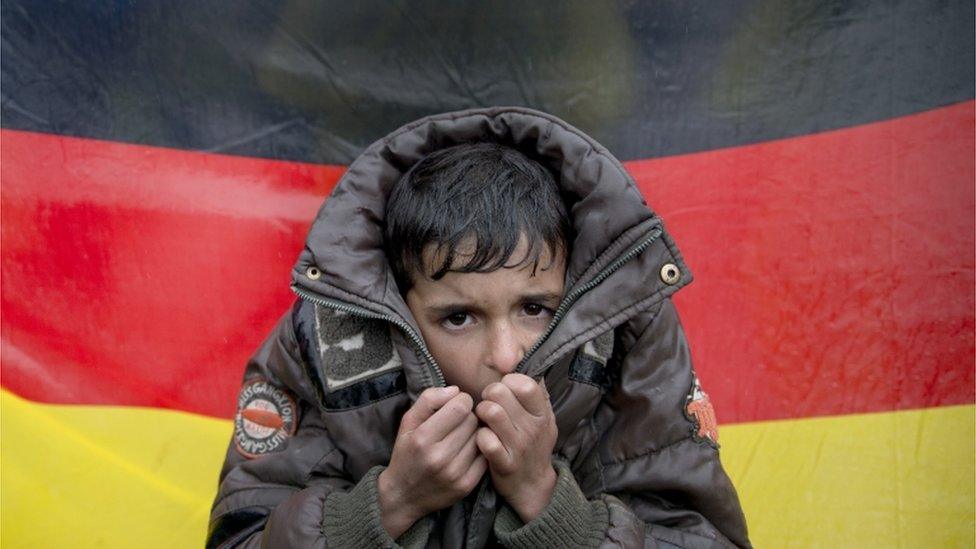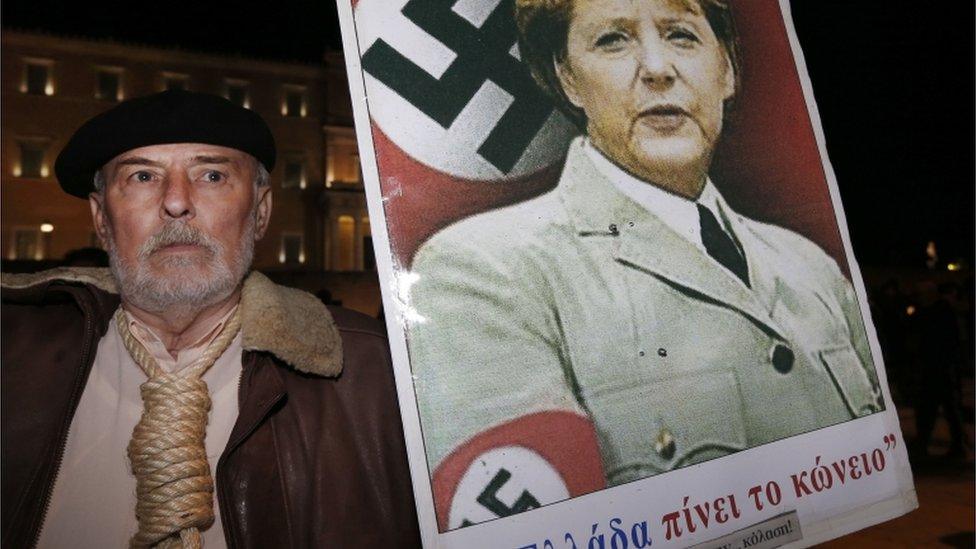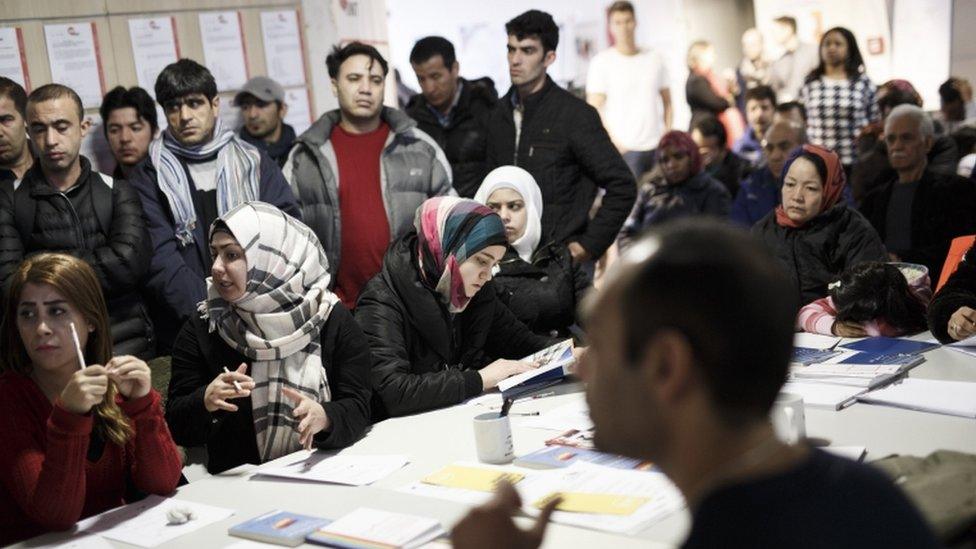German power is the real key to Europe
- Published

Chancellor Merkel faces key regional elections
We may know by the weekend if the Empress of Europe will be dethroned sooner rather than later, or if her latest deal on the refugee crisis will save her bacon.
Either way it raises profound questions about the purpose and direction of the European Union (EU).
The regional elections in Germany, external will be a good indication if Angela Merkel's plunging popularity among German voters has really been halted, external.
If it hasn't, Mrs Merkel's party may not let her stand in the next general election.
Mrs Merkel, or Anjela Myrtle as one vox populi had it on the World This Weekend, has long seemed a straightforward politician, shorn of both drama and charisma. But she is growing increasingly enigmatic, baffling even close observers, external.
The new deal with Turkey is her deal, more than the European Union's - the FT says it was done behind the back of her European allies, external, and left some of them "bruised and angered" by cutting them out in a "brutal" manner.
Migrant crisis: EU and Turkey plan one-in, one-out deal
Migrant crisis: Will Merkel be left out in the cold?
Greece needs EU help to avoid chaos, says Merkel
Even the famously myopic British media now report what Mrs Merkel says as a matter of some note.
This partly reflects the fact she has been around for ten years, longer than any other European leader.
But there is another reason, which goes to the forgotten heart of the debate about the European Union.
Who is boss? Who is in charge? Whose word counts? And how to deal with the obvious, the natural answer to those questions ever since the unification of Germany in 1871.
We don't talk about it, but it matters more than most of the froth and flotsam about this debate.
It is both right and proper that in this country the debate about EU membership is about our prosperity, security and without being too pompous, our destiny.
But in or out of the EU will not change the fact that the UK will continue to exist on the edge of a large continent with which we have long had a mingled history of occasional splendid isolation, external and equally irritated engagement.
Founding aims
When absorbed in the European question the British aim has usually been balance - to make sure no one other power has sway.
Given the potential for misinterpretation and misunderstanding I want to state explicitly that making this point is not an argument for or against continued participation in the EU - it is however an argument that we are likely to continue to be vitally engaged with the rest of Europe whether or not we are part of this particular organisation.

Many migrants have travelled to Europe since Mrs Merkel announced Germany's open door policy
You can believe the origins of the European Union were a desire for a country called Europe or a project about creating a super power to rival the US and you will have a point.
But the last part of the aphorism of NATO's first secretary general Lord Ismay, external about that organization is more apposite: "To keep the Americans in, the Russians out, and the Germans down."
The European coal and steel community, the forerunner of the European Economic Community, was founded explicitly to create a common market in the materials of war, and to keep them out of Germany's hands alone.
This may seem like ancient history - Germany is clearly not going to wage war on the rest of Europe, it is one of the least aggressive nations in the world and any danger has long past.
In one sense that is all true. It might be that German dominance of Europe is rather better for the continent than, say, if the French or Italians were in such a role.
But the problem, or at least fact, of German pre-eminence has a new and ever-building relevance.
Since reunification Germany is once again the richest and most powerful country in Europe.
Guilt over the war will take a long time to fade, and will perhaps always make the country more thoughtful about conflict than others.
Growing assertiveness
But there is an ever-growing assertiveness, and more and more Germans now believe that putting the national interest before the interests of the continent as a whole is no longer sinful and unspeakable.
It was a telling moment when Angela Merkel was first elected that she felt free to tour a submarine, like any other leader of a major power would. It didn't summon up ghosts of the past.

Greek protesters portrayed Mrs Merkel as a latter-day Hitler
But wind forward a few years and that didn't stop the Greeks putting cartoons of her portrayed as Hitler on their banners when protesting against austerity measures.
German power is at the heart of the two crises facing Europe. Angela Merkel is not to blame for the Syrian civil war or the lure of Europe as an economic destination.
But she did make it clear Syrian refugees were welcome, a move that is still puzzling the best-informed commentators.
She has insisted that other countries should do more, and that the passport-less, border-free area of Schengen should not be a victim of her call.
At the heart of the Greek Euro crisis is the view held by many influential people in Germany that their taxpayers should not have to bail out what some see as feckless, over-spending tax-dodging southerners. In a sense this is an instance of wanting the Euro to function pretty much like the Deutschmark once did.
That particular story is dormant, Greece continues to struggle, external, but out of the headlines at least.
Still, a rocky, profoundly difficult road lies ahead for the Euro. There is a general agreement in the Five Presidents' Report, external that the countries using the Euro should move towards fiscal and financial union, including a Eurozone treasury, external.
The main reason that nothing has been done is that there is no agreement whether this should be on the German model or not, external.
Tempered ambition
Of course the two crises wouldn't, in one sense, exist if the European Union wasn't around.
There wouldn't be a Euro, for a start. And there wouldn't be a passport-free area for migrants to travel through.
So in that sense Germany's wishes wouldn't matter.

Germany has seen a big increase in migrants coming to the country
Greece could do whatever it wanted with the drachma without it worrying German taxpayers. Mrs Merkel could be a siren to Syrians and she would have to find a way of getting them to Germany, as presumably they would be stopped at borders, which had never ceased to exist.
But again, if the EU simply went away, it wouldn't erase some serious questions..
You could argue that by having to find agreement with 27 other countries, not to mention the Commission and the European Parliament, the will of Germany is tempered by a natural filter, that is bound to water down its ambitions.
Would Germany unfettered from an organisation like the EU be more modest in its ambitions?
Is the European Union no longer a restraining order, but the means by which Germany gets its way? Or is it simply the only game in town, the arena in which Germany exercises its power?
Hard questions to ask, let alone answer, but worth pondering at a critical crossroads.